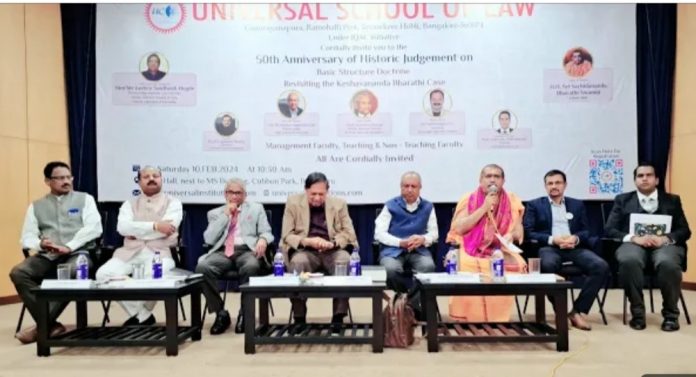– Mohammed Atherulla Shariff
Bengaluru, Feb. 11: The historic judgment delivered half a century ago that fortified the fundamental character of the Constitution of India was celebrated here Saturday. The famous Kesvananda Bharati Mahswamiji and others Vs the State of Kerala of 1973 was the topic chosen for discussion in the assemblage of legal luminaries, academicians, journalists and civil society members. The case was heard by a 13-member bench. Seven members of the bench came on common grounds and pronounced that Parliament can amend the Constitution but cannot disturb the basic structure or fundamental features.
Justice Santosh Hegde, former Supreme Court Judge said: “There were rumours of political inclination of the judges who were in the bench, controversies arose and politics played a part. But the seven judges didn’t succumb to the external or political powers and pronounced the historic judgment.”
Speaking on the occasion, another former High Court judge Justice Nagmohan Das lamented, in the last 10 years 24% of the time in Parliament has been wasted in screaming, fighting, protesting and walking out. He said 47% of the bills were passed without any debate in Parliament and Constitutional amends were made without debates.
Justice Das pointed out that since last year, there has been a relentless discussion about revisiting the Kesavananda judgment. He questioned why Parliament has to be given ultimate powers. “Think about Parliamentary proceedings in the last 10 years, which have seen undefeated amendments and passing of bills. In such times, if we give Parliament supreme powers, what will be the guarantee that they won’t change the Constitution?”
He acknowledged the loopholes in democracy and questioned if there was any other alternative to parliamentary democracy.
Taking a dig at Das’s comment on the Kesavananda judgment saving our democracy and its features, the former Advocate General of Karnataka Prof Kumar questioned: “If secularism is the most basic structure of our saved democracy, how are two accused in the Babri Masjid case getting Bharat Ratna?
Kumar said: “Kesavananda emasculated the state economy for the rich to become richer and the poor to become poorer.”
Senior Advocate, Vishala Raghu HL, Chairman of Karnataka State Bar Council, and Sri Sachidananda Bharati, from Edneer Mutt, expressed their views at the event organised by the Universal School of Law.




